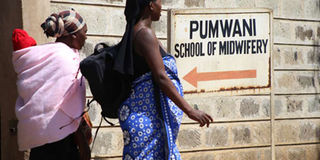Pain of low-income women accessing gynaecologists in Kenya

Patients leave Pumwani Maternity Hospital, Nairobi, on April 13, 2015. Only visibly pregnant women are allowed to see an obstetrician at the facility. PHOTO | NATION MEDIA GROUP
What you need to know:
- At the moment, registrars are on strike after their lecturers downed their tools two months ago.
- Only consultant doctors are working, and according to a source at the hospital, they see only 10 patients a day.
Getting gynaecological services in Nairobi’s public hospitals is a tedious process that leaves women seeking the specialised services exhausted.
Those who cannot afford the luxury of getting treatment at private facilities have to contend with long queues and a host of probing questions, within earshot of other patients, from medical personnel.
Even then, a patient might still not get a doctor to attend to her.
At Kenyatta National Hospital, women seeking gynaecological services first queue with other patients at the casualty area, where they state their problem.
The nurses at the desk then determine whether or not they need to see a specialist.
The consultation charge for ante-natal services here is Sh600, although this depends on the tests to be done.
STRIKE
At the moment, registrars (doctors pursuing their master’s degrees) are on strike after their lecturers downed their tools two months ago.
These graduate students make up the bulk of the workforce at the hospital, and their absence has crippled operations in almost all departments, including gynaecology.
As a result, only consultant doctors are working, and according to a source at the hospital, they see only 10 patients a day, after which they go to their private clinics.
On the day we visit, there is no pregnant woman in sight at the ante-natal area.
When the Nation tried to get an appointment with a gynaecologist, the attendant at the clinic said there was none available.
CONSULTATION FEES
A visit to the Doctor’s Plaza a few metres from the Accident and Emergency Department clearly shows that private maternal health services are beyond the means of low-income women.
Consultation fees at the four gynaecologists’ clinics we visited start at Sh3,000. There were no queues there and patients simply walked in.
The amount needed for an antenatal clinic appointment in the public section of the hospital is Sh2,700.
It includes the consultation fee, blood, glucose and urine tests, as well getting a file opened. Follow-up clinics cost Sh1,500.
DOCTORS
The process at Mbagathi Hospital is no different. To see a doctor, a patient begins by queuing at the Casualty Department.
She pays Sh100 to have a file opened and then proceeds to the waiting bay with all other patients to see a general practitioner.
Only if the GP cannot handle her case is she referred to a specialist. It is then that an appointment is made for her, depending on the availability of doctors.
The consultation fee at the ante-natal clinic here is Sh300.
PREGNANT
At Pumwani Maternity Hospital, only visibly pregnant women are allowed to see an obstetrician.
The Nation learnt that only mothers in the late stages of the first trimester are registered and allowed to attend ante-natal clinics, leave alone see the doctor.
On the day we visited, those that had met the condition and had requested to see a doctor were advised to go and return at 1pm. The clinics run from 8am to 5pm.
Jane, who did not disclose her second name, was visiting the clinic for the first time — in her third trimester.
Asked why she waited so long, she said she could not afford the charges.
After her turn at the casualty queue, she was told she needed to have an ultrasound, which costs Sh1,800. She did not have the money.






